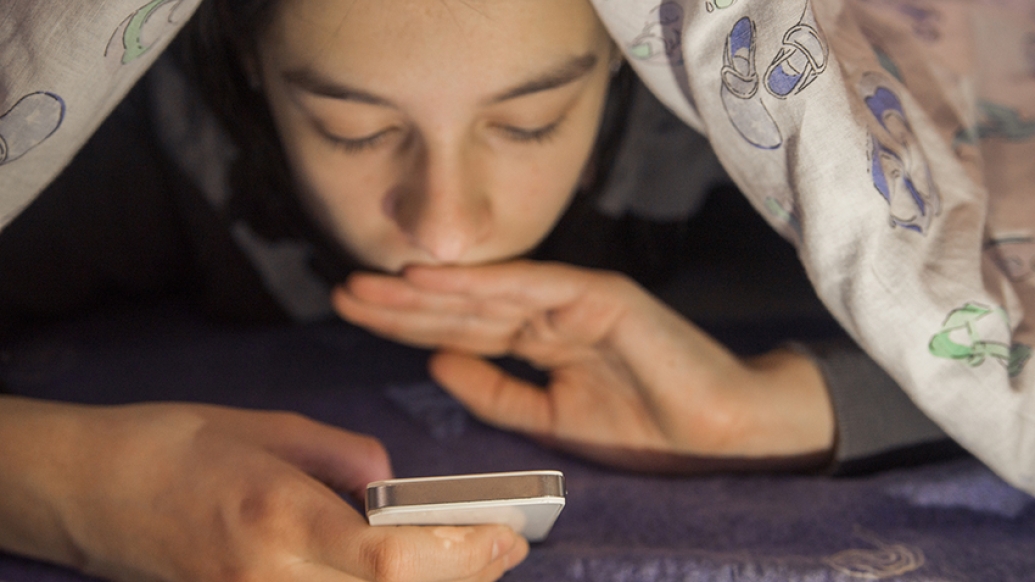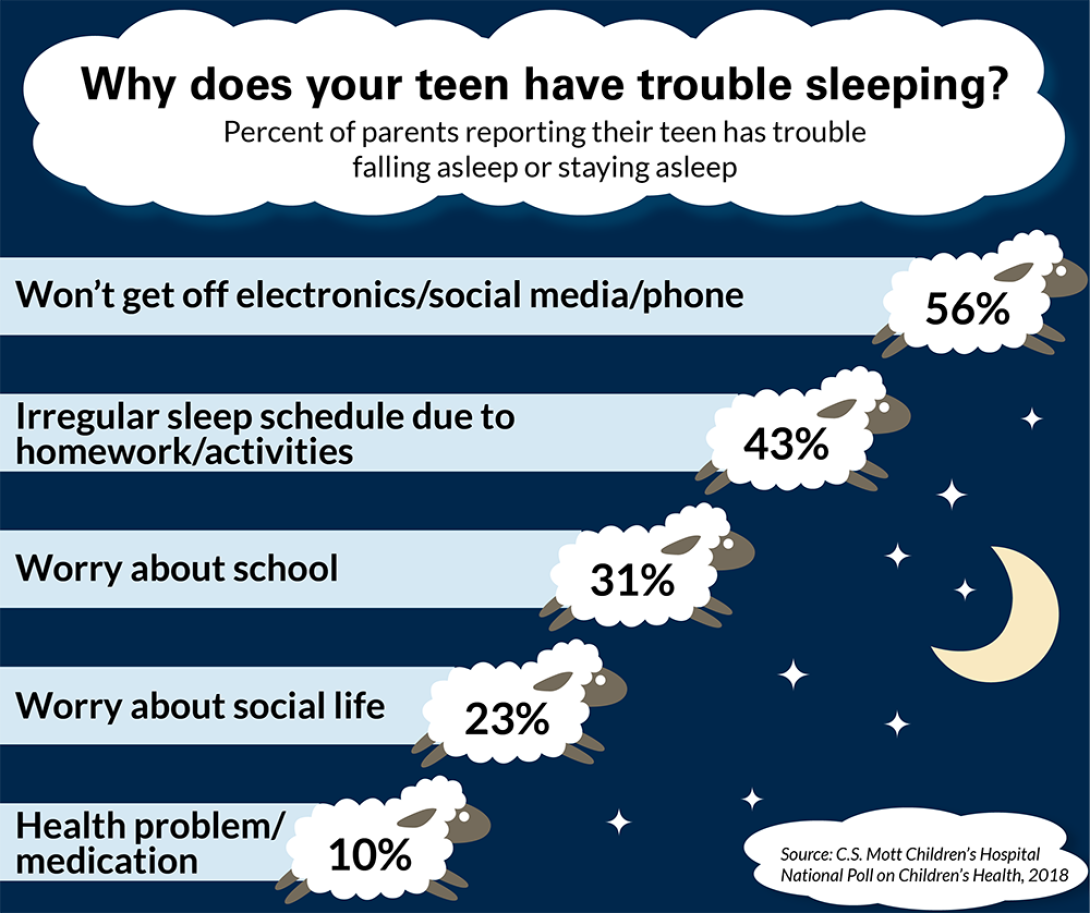Healthy sleep is critical during adolescence, but a nationwide survey finds many parents have sleep-deprived teens at home. Here’s how to help.
1:00 PM
Author |

Staying up late to scroll through social media and catch up with friends on phones may be second nature for many teens.
But the habit comes at a cost: Forty-three percent of parents say their teens struggle to fall asleep — or wake up and can't get back to sleep — according to the latest University of Michigan C.S. Mott Children's Hospital National Poll on Children's Health.
LISTEN UP: Add the new Michigan Medicine News Break to your Alexa-enabled device, or subscribe to our daily audio updates on iTunes, Google Play and Stitcher.
More than half of parents of teens with sleep troubles think electronics are to blame.
Once they hit puberty, adolescents need eight to 10 hours of sleep per night, but just over a third of American teens say they are getting at least eight hours on a typical school night.
And research shows that inadequate or disrupted sleep can have long-lasting health effects.
"Teen sleep deprivation is a growing public health issue because most young adults simply aren't getting enough sleep," says Ellen Selkie, M.D., an adolescent medicine physician at Mott. "We sometimes focus on sleep quality for young children but forget that adolescents' brains and bodies are still developing, too."
Poor sleep negatively affects teens' ability to concentrate and perform well at school, Selkie notes. Research also links inadequate sleep to health problems ranging from obesity to anxiety and depression. Mood problems also can impair relationships.
For teen drivers, lack of quality sleep can be particularly dangerous, increasing their risk of car accidents.
So what's a parent to do?
Selkie, in her own words, offered simple ways to improve a teen's sleep hygiene.
How to help teens get more sleep
1. Ban electronics from the bedroom
Not being able to stay off electronics — including social media and cellphones — was the top reason polled parents cited for their teens' sleep troubles. Some research indicates that the light exposure from screens also disrupts traditional cues sent to the brain to wind down. That's why I recommend physically removing the device.
2. Charge phones elsewhere
Make it a family rule to charge all devices in a parent's bedroom or another isolated space to reduce temptation at bedtime. Many teens I've seen in my own practice actually describe a sense of relief when their parents limit phone use because it takes away some of that pressure to keep up with social news and what their peers are up to.
MORE FROM MICHIGAN: Subscribe to our weekly newsletter
3. Maintain a regular sleep schedule
Keeping a sleep schedule within an hour of what's usual helps keep the circadian rhythm in check. Sleeping in hours later than normal on the weekends and during school breaks makes it even more difficult to switch back — and can lead to more tiredness and grogginess. "Catch-up" sleep is also unlikely to make up for the full amount of sleep debt accrued over a week, and we don't believe it's as restorative to the body.
4. Discourage afternoon naps
Even though they may provide more sleep short term, naps make it harder to fall asleep at night. They also break up sleep, which means lower quality of sleep and fewer benefits. If this is a habit, do everything you can to quit naps for a week to make it easier to not nap going forward.
5. Don't procrastinate on big tasks
I encourage doing homework and anything else necessary as soon as teens get home from school, if possible. It's typical to want to watch TV or play on your phone for a few hours first, but it's better to keep the momentum going from the school day. We realize this isn't always feasible, but anything to prevent teens from completing important deadlines at the end of the day will make it easier to wind down for bed.

6. Stick to sleep-friendly bedtime routines
In addition to banning electronics, limit other distractions in the bedroom. All stimulation should be minimized. Keep lights low and active pets out of the bedroom. We discourage using music or sound machines to help with sleep because they may actually keep the brain stimulated.
7. Limit caffeine
I don't ever advocate for teens to consume caffeine. But if they are going to, we discourage energy drinks, which tend to have much higher levels of caffeine than tea or coffee. We also don't recommend any caffeinated drinks later than lunchtime, to prevent sleep disruption. It's better to get to bed earlier than to get a surge of energy in the day.
SEE ALSO: School Night Bedtime Tips Every Parent Should Know
8. Try melatonin
We don't know why, but the hormone that signals our brain to sleep (melatonin) is secreted later in the evening for teens. It's not uncommon for teens not to get sleepy until 11 p.m. or midnight. Natural supplements of melatonin are over-the-counter and may help reset the body's internal clock. This should be taken an hour or more before bedtime. There isn't any research suggesting any long-term harm from using this as a sleep aid. We don't recommend prescription medicine; it can make you groggy and cause a medication "hangover."
9. Realize sleep isn't instant
We don't expect people to fall asleep right away. It can take half an hour for someone to truly fall asleep. Have your teen follow a routine that helps them de-stress and wind down to get their body into sleep mode and send the right signals to the brain that it's time to snooze (e.g., bath, reading, bed).
10. Consult a health provider
Sometimes an underlying medical issue, such as depression or sleep apnea, may be causing sleep trouble. If a teen continues to have problems falling asleep or is waking up multiple times at night despite healthy sleep hygiene habits, speak to a sleep specialist.

Explore a variety of health care news & stories by visiting the Health Lab home page for more articles.

Department of Communication at Michigan Medicine
Want top health & research news weekly? Sign up for Health Lab’s newsletters today!





